Understanding Macaw Parrots: Costs and Considerations
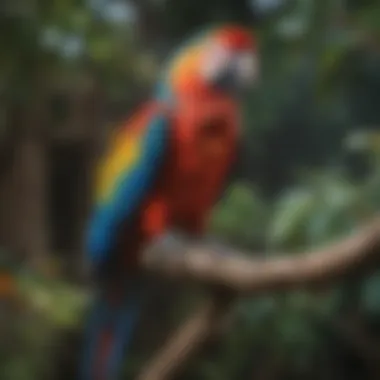
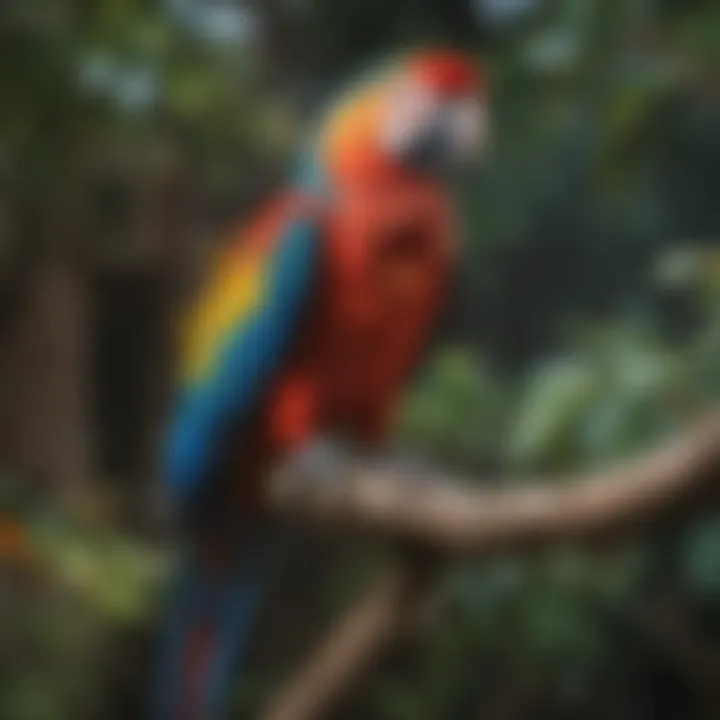
Intro
Owning a macaw parrot comes with a sophisticated understanding of the financial commitment involved. Before adding this magnificent bird to your family, it's crucial to scrutinize the various costs beyond the initial price tag. The complexity of ownership demands awareness of continued expenses connected to maintenance, care, and enrichment needs. This guide is designed for pet bird owners, aspiring bird parents, and bird breeders who wish to delve deep into these financial considerations. Here, we explore gifted insights and practical tips to ensure responsible macaw ownership while promoting proper budgeting and long-term financial preparedness.
Care Tips
Daily Care Routines
Providing excellent care for a macaw goes beyond just feeding. These vibrant birds require daily interaction, mental stimulation, and playtime. Allocate about 2-3 hours daily for active engagement with your macaw. Simple routines could include offering fresh water, changing their food, and allowing them to have out-of-cage time. These activities are essential to their health and vitality.
Cage Setup and Maintenance
Cage selection is fundamental for macaw comfort. A suitable cage needs to be spacious and withstand the beak strength of these birds. Ideal dimensions often start from 3 feet by 4 feet, allowing room for movement. Regular maintenance includes cleaning and inspecting for wear or damage. Replace any components showing signs of deterioration promptly.
Hygiene and Cleaning Practices
Hygiene is vital in keeping your macaw healthy. Debris, waste, and leftover food should be cleaned daily to prevent bacterial growth. Weekly comprehensive cleaning should include any toys, perches, and dishes with bird-safe detergents. Regular misting can also help maintain skin hydration, complementing standard cleaning routines.
Seasonal Care Adjustments
Take seasonal changes into account for your macaw's environment. During hot months, ensure an ample supply of fresh water and consider cooling options, including air circulation. Comparatively, winter might demand more attention to warmth and humidity levels inside their habitat. Understanding their seasonal adjustments is essential for sustaining their health.
Behavioral Insights
Understanding Bird Body Language
Recognizing your macaw's body language provides insight into their emotional and mental state. For example, a fluffed up bird often indicates stress or discomfort, while a calm posture shows relaxation. Get familiar with these signs as it leads to deeper bonding with your pet.
Common Behavioral Issues and Solutions
Like humans, macaws can experience behavioral issues, including excessive screeching, biting, or feather plucking. Ignoring these concerns may escalate over time. Strategies such as establishing a routine and creating a safe space while redirecting unwanted behavior can often lead to solutions.
Positive Reinforcement Techniques
Using positive reinforcement strengthens the bond between you and your macaw. Rewarding desirable behaviors with treats or affection encourages repetition. Effective training is a layered process; starting slow can deliver more profound results over time.
Social Interaction Needs
Macaws are social creatures with an inherent need for interaction. Spending time engaging with them helps nurture their emotional health and happiness. Neglect in socializing can lead to behavioral problems, highlighting the essential nature of ongoing interaction.
"Social interaction is not just recommended for macaws; it's fundamental. Understand they're as social as us."
Nutrition Guides
Essential Diet Components
Macaws require a varied diet ranging from high-quality pellets, fresh fruits, and vegetables. A healthy diet maintains their well-being. Quick staples can include almonds, apples, and peas, knowing that avocados and chocolate are harmful.
Safe and Toxic Foods
It's equally important to prioritize what to avoid in your bird’s diet. Toxic foods include:
- Avocados
- Chocolate
- Caffeine
- Alcohol.
Awareness can spare much potential harm.
Supplements and Treats
While a balanced diet is critical, supplements can help enhance overall health. Calcium and vitamin A deficiencies are common; thus, bird-safe supplements are often suggested. Treats, offered sparingly, promote a rewarding experience that fosters engagement.
Feeding Strategies for Different Species
Macaws are distinct from other birds, requiring attention to their specific dietary needs. Research pertaining to different subspecies ensures nutritional requirements are consistently met. This foundational element significantly impacts overall well-being.
Wellness and Health
Routine Health Checkups
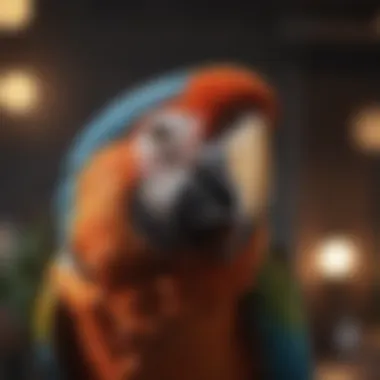
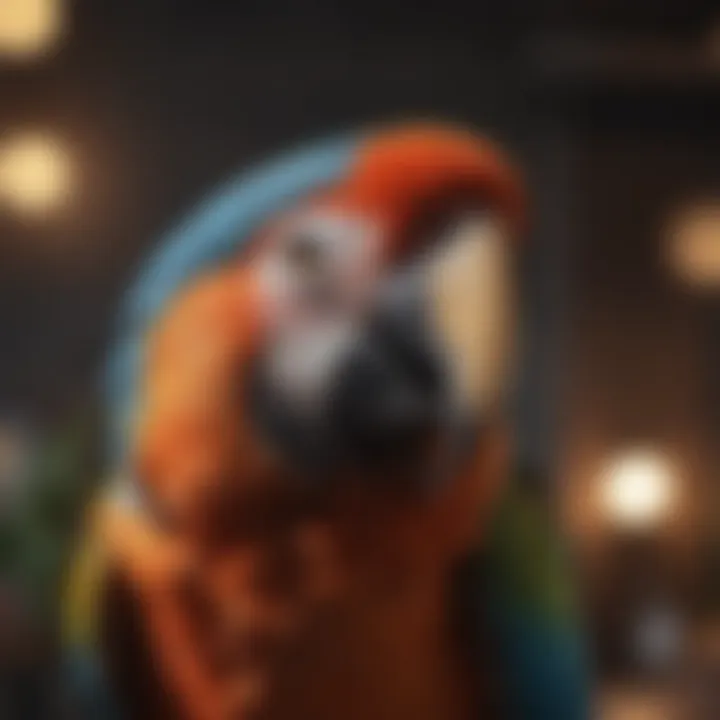
Consistent visitations at the avian vet pave the path to detecting potential health concerns. A thorough examination ensures timely interventions in combating sickness. Ideally, these checkups should occur every six months.
Identifying Symptoms of Illness
Being alert to common illness symptoms is crucial. These include lethargy, refusal to eat, or unusual droppings. Identifying such signs early is the key to successful treatment.
Preventative Care and Vaccinations
Preventative care measures involve vaccinations. Avian vets will advise when specific shots are required based on your bird's lifestyle. Consultations can streamline preventative protocols, lowering risk down the line.
Mental and Emotional Well-being
Like physical health, mental well-being is key. Macaws thrive on enrichment activities and interactions. Encouraging play and curiosity solves boredom. It would be unwise to dim their inquisitive nature.
Enriching Activities
Toys and Playtime Ideas
Toys foster healthy physical and mental stimulation. Rotating toys to maintain interest is advisable. Some potential toys include wooden blocks, ropes, and bells made explicitly for birds.
Training and Tricks
Incorporating training sessions into their daily routine fosters their cognitive development. Simple commands such as "step up" enhances not just behavior but also the bond between owner and bird.
Outdoor Activities and Interaction
Physical activity outside shines a spotlight on enrichment. Go with your macaw to safe outdoor areas. Leash training enables outdoor movements. Introducing such activities brings new moments to explore.
DIY Projects for Mental Stimulation
Building does not have to be pricy. Crafting simple toys from natural materials offers profound engagement. Bird-safe craft materials could often include paper, string, or various wood types, encouraging creativity.
Understanding the costs related to owning a macaw parrot requires a detailed examination beyond any simplistic financial model. By engaging with the nuances captured within their care tips, behavioral insights, relevant nutrition guides, and essential wellness practices, potential owners can ensure that they embark on this journey equipped with mechanics of sound financial preparedness. Ultimately, responsible macaw ownership combines knowledge with financial insights tailored to unique needs.
Prologue to Macaw Parrots
Understanding the financial aspects related to macaw parrots is crucial for anyone considering these birds as pets. This introduction sets the scene for comprehending the costs, obligations, and long-term commitments that come with owning a macaw. Parrot enthusiasts should recognize macaws not only for their visual beauty and intelligence but also for the significant investment required in maintaining their health and happiness.
Overview of Macaw Parrots
Macaw parrots are notable for their vibrant plumage, which reflects a range of dazzling colors. Ranging in size, most macaws are known for large wings, strong beaks, and remarkable social nature. These birds can form deep bonds with their owners and are known for their ability to mimic human speech. Their intelligence makes them engaging companions. However, this same intelligence can also lead to necessary interactive enrichment, impacting the long-term care requirements and financial responsibilities for the owner.
Additionally, though popular among pet enthusiasts, identifying the potential challenges macaw ownership entails is essential. Their social needs must be met for their wellbeing, and neglect can result in behavioral issues.
Popularity and Characteristics
Macaw parrots have gained a reputation as sought-after pets primarily due to their attractive appearances and charming personalities. Often considered a status symbol, these birds attract attention in aviculture. However, one must consider their temperament and care requirements. Macaws are social and can display affectionate traits towards family members, but they also require substantial interaction, mental stimulation, and space to roam or play.
Their vocalizations can be loud and frequent. Receiving sound bite from this vocal property might not suit all living arrangements. Also, understanding their dietary needs and preferred habitat can significantly enhance the owner’s experience with these birds.
In summary, adopting a macaw is not just about a purchase; it includes understanding long-term companionship, nutrition, space needs, and suitable interaction levels.
Initial Cost of Acquiring a Macaw
The initial cost of acquiring a macaw is a critical consideration for anyone thinking about becoming a macaw owner. These beautiful birds, known for their intelligence and vibrant personalities, demand a significant investment right from the start. Understanding these costs not only prepares potential owners for the financial commitments but also ensures that they can provide a suitable environment for their new feathered companions.
When evaluating the initial costs, prospective owners should consider various paths of acquisition, including purchasing from breeders or adopting from rescue organizations. Each option comes with its own financial implications and benefits, and recognizing these factors is essential for making informed decisions.
Purchasing from Breeders
Buying a macaw from a breeder is often the first choice for those wishing to acquire these birds. Breeders offer pure-bred species, which might include, for example, the Blue-and-yellow Macaw or the Scarlet Macaw. The price for a macaw can vary significantly based on factors such as the species’ rarity and the breeder's reputation. Prices can start around $1,500 and can go well over $3,000 for more exotic varieties.
Moreover, when considering breeders, ensure that you choose a reputable one. Renowned breeders often invest more in the health and genetics of their birds, which can lead to long-term savings on veterinarian costs and behavioral training. Ask to see health documentation and guarantee that the macaw was raised under safe conditions.
Adoption from Rescue Organizations
Rescuing a macaw from an organization is another appealing approach that can be cost-effective. Adoption fees typically range from a few hundred to a thousand dollars, depending on the bird's age and species. This option not only alleviates financial burdens but also gives a macaw in need a second chance at a happy life.
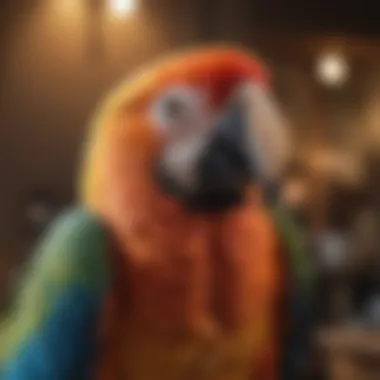
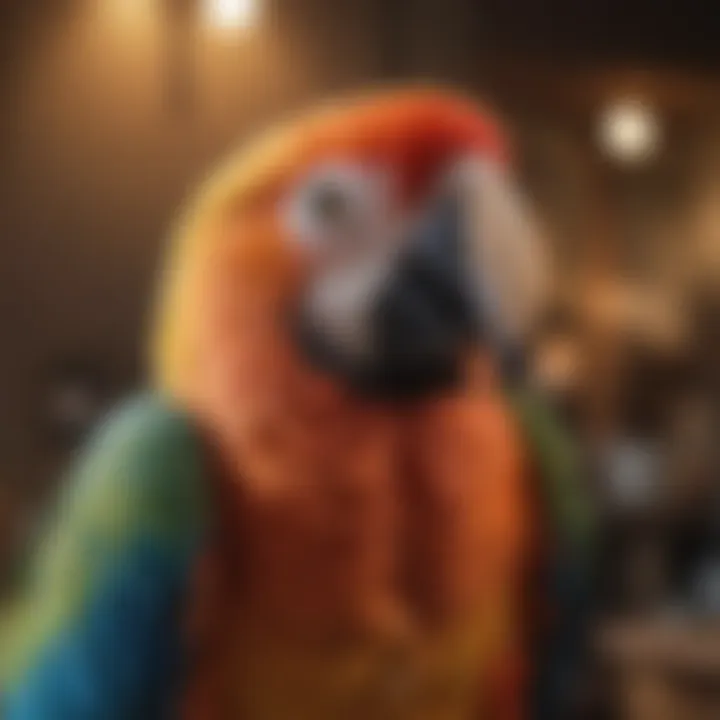
Adopters should be aware that rescue organizations may require specific criteria to be met before adoption, ensuring that each bird finds a suitable home. Accpetting behaviors typical of previously owned macaw may also guarantee a smoother transition. Moreover, adopting typically includes initial health checks and sometimes, comes with a starter kit including food and toys.
Factors Influencing Purchase Price
An array of factors influence the market price of macaws. Some of these factors include:
- Species: As noted earlier, some species are significantly rarer than others, which drives up costs. For example, the Hyacinth Macaw is often much more expensive than local-looking species like the Green-winged Macaw.
- Age: Younger birds tend to demand a higher price since they can be trained better and offer a longer companionship period.
- Breeder Reputation: A well-respected breeder often charges more. The higher fees may reflect those companies’ investment into the birds’ health and customer education.
Always consider the long-term commitments and costs of ownership when selecting a macaw. Initial prices reflect not only the cost of the bird itself but the commitment of caring for a long-lived, intelligent creature.
Macaw Species and Their Costs
Understanding the specific costs associated with different macaw species is crucial for potential owners. The variations in species come with diverse price tags and care needs. Knowing this allows prospective buyers to make informed decisions aligned with their financial situations. In turn, this perspective encourages responsible ownership while promoting the well-being of these vibrant birds. It sets a foundation for understanding both the initial and ongoing financial obligations involved in macaw ownership.
Popular Macaw Species and Prices
Certain macaw species attract more attention due to their beauty and temperament. Each species varies in terms of pricing, which reflects their rarity, demand, and breeding costs. Popular species include the Blue-and-yellow Macaw, Green-winged Macaw, and Scarlet Macaw.
- Blue-and-yellow Macaw: Known for its striking colors, prices can range from $1,000 to $3,000 depending on factors like breeder reputation.
- Green-winged Macaw: Larger than many others, their prices typically start around $2,000 and can reach $4,000 or more due to raising complexities.
- Scarlet Macaw: Highly sought after for their vivid plumage; prices commonly range from $1,500 to $3,500, influenced by various aspects such as availability.
When selecting a macaw species, it's vital to also consider the potential for higher healthcare costs should the bird encounter certain health problems.
Rare and Exotic Varieties
In addition to popular choices, there is a range of rare and exotic macaw species, each commanding even higher prices. For instance, the Hyacinth Macaw, often considered the most expensive parrot, can prohibitively cost upward of $12,000. This high price reflects both its rarity and the specialized care it needs.
Other examples include:
- Green-cheeked Macaw: Typically found at $1,200 to $4,000 depending on lines and availability.
- Spix's Macaw: Critically endangered, may reach prices near $18,000, reflecting its notable scarcity in the avian market.
These birds, though appealing, introduce additional responsibilities due to their unique care demands and limited reproductions. It may require dedicated research to fully grasp the implications of ownership for these exotic varieties.
Understanding the different costs associated with macaw species ensures that future owners can financially prepare for the commitment to care and maintain these majestic birds.
Ongoing Costs of Macaw Ownership
Owning a macaw parrot is a significant commitment that goes beyond the initial purchase price. Understanding the ongoing costs is essential for potential owners who want to ensure they provide a healthy and happy life for their feathered friends. This section highlights the different expenses involved in caring for macaws, as well as the benefits of being mindful about these costs.
Feeding and Nutrition
Proper nutrition is crucial for the well-being of macaws. Their diets must include a mix of high-quality pellets, fresh fruits, vegetables, and occasional nuts. This variety is key to providing essential vitamins and minerals, helping to prevent health issues. An average macaw may consume between $20 to $50 monthly on food alone, depending on dietary needs and preferences.
It's vital to prioritize the high quality of food. Investing in premium brands like Harrison’s Bird Foods or Kaytee can ensure proper nutrition. You might also want to rotate seasonal fruits and vegetables, improving their diet while keeping costs in line. Considerations must also include potential additional costs for specialty diets if your bird has particular health requirements.
Housing Requirements
Housing for a macaw is more than just an adequate cage; it's about creating an environment where your bird can thrive. A spacious cage is essential for their size and tendency to fly, alongside comfortable and safe features. Expect to spend at least $1,000 on a large, high-quality cage. After the initial purchase, the ongoing refuge expense includes substrate materials, bedding, and cleanliness supplies, which may cost $10 to $30 monthly.
Cage accessories also contribute to the ongoing costs. Toys and perches are essential for mental stimulation and preventing boredom. Make budgeting room for replacing these materials every few months, accounting for another $30 to $50 per quarter.
Healthcare Expenses
Regular veterinary check-ups are crucial for macaw health. You should plan for annual vet visits, which can run from $100 to $300 depending on care needs, including vaccinations and health screenings. Unexpected health issues may arise, necessitating additional expenditures that can range widely. A serious illness could cost thousands, but regular preventative care can reduce risks significantly.
Additionally, consider pet insurance to offset some unexpected costs. Policies tailored for birds can range from $15 to $50 monthly, providing a financial cushion for emergencies.
Enrichment Activities and Supplies
Mental and physical stimulation is critical for macaw happiness. These birds are intelligent and curious creatures, requiring plenty of toys and activities to avoid behavioral issues. Between $50 to $100 may be necessary each month to supply new toys and enrichment materials. Items such as puzzle toys, ropes to climb, and swinging perches are great choices.
Beyond toys, regular social interaction is invaluable. If your schedule is busy, consider hiring a bird sitter or enrolling your macaw in avian daycare, creating additional recurring costs of $20 to $50 per visit.
Important Note: It is vital to evaluate all these ongoing costs to ensure a stable commitment to owning a macaw. Understanding these expenses prepares owners for responsible care and enhances the overall experience.
Overall, the ongoing costs of macaw ownership extend well beyond feeds and cages. Regular assessments of budgetary allowances will help prospective owners be better equipped for the joy and challenges of macaw companionship.
Long-Term Financial Commitment
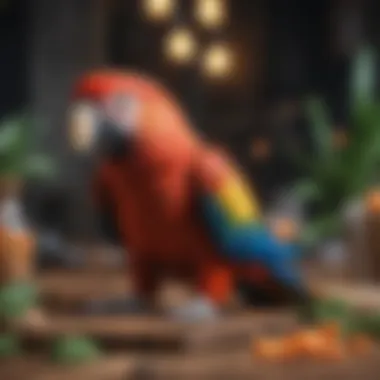
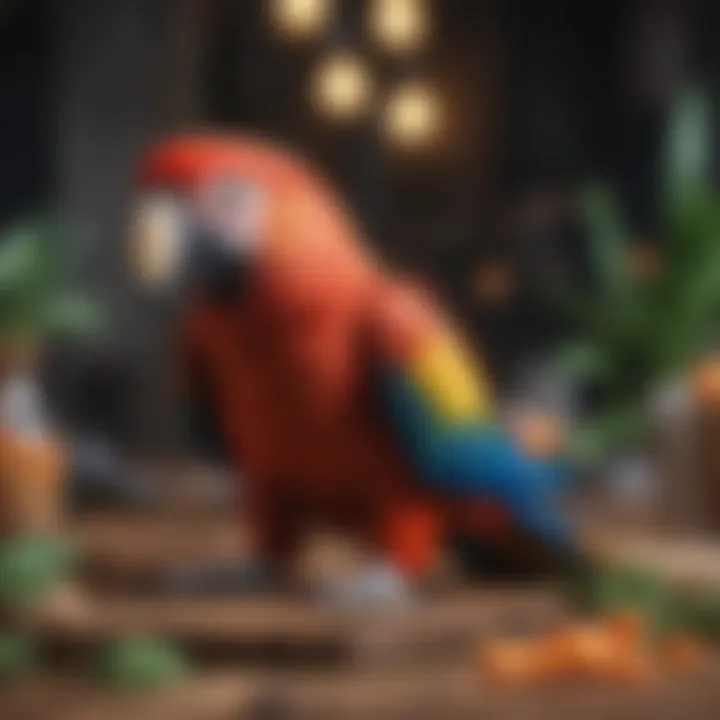
Long-term financial commitment is a crucial element in the discussion of macaw parrot ownership. These birds are not just pets; they are long-lived companions that require thoughtful financial planning. Macaws can live for 30 to 50 years or even longer, which implies a significant duration of commitment. Understanding this longevity is essential as it directly relates to the ongoing costs and responsibilities for their care.
The primary benefit of acknowledging this commitment upfront is to ensure that prospective owners are ready for the long haul. By recognizing that macaws may outlive initial budgets and plans, owners can be more proactive. Planning for financial liabilities can help avoid scenarios where a macaw suffers from neglect due to lack of resources.
A few key considerations can further emphasize the importance of preparing for a long-term commitment:
- Veterinary Expenses: Routine health checks, unexpected illnesses, or emergencies can be financially daunting. Given that avian medicine is specialized, costs could be higher than typical pet veterinary visits.
- Food and Nutrition: Macaws require a balanced diet rich in vitamins and minerals over their lifetime. This spending can accumulate considerably, impacting household budgets annually.
- Enrichment and Housing: Creating a stimulating home environment is an ongoing expense. Housing needs, including cages, and toys grow more complex with the development of the macaw.
Paying attention to the long-term aspect will fundamentally influence the patterns of spending over the years. Ensuring that these financial costs are accounted for as part of the initial and ongoing budget can create a more stable and happy incomparable partnership with a macaw.
Life Expectancy and Its Implications
The life expectancy of a macaw brings about critical implications for prospective owners. Not only does it signify a commitment to care for the bird for decades, but it also highlights the necessity to prepare for varied expenses through different life stages.
For example, younger macaws may require more initial investments due to training and socialization. In contrast, older macaws often need increased medical attention, which can drive costs higher. This contrasting financial outlook must weigh heavily in one’s decision to secure a macaw as a lifelong pet.
As an average, macaws have a life span between 30 to 50 years. Therefore, the ongoing financial planning needs to extend long past just purchasing or adopting the bird. The future costs can quickly compound into an overwhelming burden if they're not addressed.
Planning for Future Costs
Planning for future costs should comprise a strategic part of any approach to macaw ownership. A few outlined strategies can help streamline this planning and minimize future surprises regarding expenses:
- Establish a Dedicated Fund: Creating a separate savings account specifically for avian care can help accumulate funds necessary for unexpected situations or regular costs.
- Regular Cost Assessment: It's wise to revisit costs associated with food, healthcare, and enrichment activities periodically. Adjusting budget allocations can prevent running into financial strains later.
- Engage with Veteran Owners: Building relationships and learning from those who have cared for macaws is invaluable. Experienced owners can provide insight into potential future costs that one might not initially consider.
Structuring financial preparation around realistic life expectancy and ample future projection will create a less stressful trajectory for welcoming a macaw into one’s life. By doing so, aspiring bird parents can solidly provide the long-term commitment these magnificent birds truly merit.
Financial Planning for Macaw Ownership
Effective financial planning is an essential aspect of macaw ownership. A parrot like a macaw demands significant fiscal commitment beyond the initial purchase price. From health care expenses to specialized dietary needs, macaws require ongoing and comprehensive financial consideration. Not planning adequately can result in overstretched budgets or unprepared households.
Adopting a pet parrot like a macaw is not a trivial task. Understanding the total cost is critical. Assessing expenses gives potential owners the ability to make informed decisions and avoid impulsive purchases based on emotions alone.
Setting a Budget
When bringing a macaw into your home, setting a clear budget is crucial. You need to consider various factors related to initial and ongoing costs. Here are some key elements to factor into your budget:
- Purchase costs: Price of the bird varies by species and can range significantly.
- Food: High-quality pellets and fresh produce are essential for a balanced diet.
- Cage and accessories: Macaws need spacious cages and various toys for enrichment.
- Health care: Routine vet visits, potential emergencies, and specific care requirements.
- Miscellaneous: Other costs, such as grooming items, cleaning supplies, and any potential boarding.
Having a detailed budget ensures you prepare for regular expenses associated with your macaw. An effective budget gives clarity and direction, allowing owners to allocate funds wisely. However, flexibility is also vital. Unexpected expenses often occur, such as unforeseen vet bills or needing to replace worn-out equipment.
Saving Strategies
Along with budgeting, implementing effective saving strategies helps dog owners better prepare for the financial commitment of owning a macaw. Consider these approaches:
- Emergency fund: Aim to save a percentage of monthly income. Allocate it specifically for your macaw’s unexpected expenses, including medical emergencies.
- Monthly saving plan: Set aside a fixed amount each month dedicated to your macaw. Use this amount for regular grooming, enrichment supplies, or scheduled vet appointments.
- Price shopping: Look for deals on foods, toys, and accessories by comparing prices online and at local pet shops. It could be wise to set alerts or newsletters for promotions.
By adopting these strategies, you strengthen your financial stability regarding macaw ownership. Prepared owners tend to handle financial responsibilities effectively. They also enhance their macaw’s wellbeing with professional healthcare and quality care items.
Financial preparedness not only prolongs the life and happiness of your macaw but also grants you peace of mind and fosters a lasting companionship.
In summary, sound financial planning is the backbone of responsible macaw ownership. By setting a realistic budget and incorporating saving strategies, future owners can lessen the stresses often associated with unexpected costs and complexities of care.
Culmination
The conclusion section serves as a vital touch point for future macaw parrot owners, synthesizing the financial implications that will influence decisions throughout ownership. Understanding the costs involved encompasses more than just the initial price tag of the bird. This comprehensive guide thoroughly examines initial expenses and ongoing care costs, making it a valuable tool for readers.
Summary of Financial Considerations
In summary, prospective owners must grasp the holistic financial structure that surrounds macaw ownership. This structure includes not only the purchase price but also ongoing expenses such as feeding, housing, healthcare, and enrichment activities. All these contribute to the big picture when caring for a macaw.
A few key considerations include:
- Initial Costs: Prices differ based on macaw species and whether you adopt or purchase from breeders. Varieties can range drastically.
- Ongoing Costs: A monthly budget should account for specialized nutrition, suitable housing, and regular vet check-ups.
- Long-Term Commitment: Macaws live for many years, meaning their care becomes a continual investment over their lives.
It is critical for owners to prepare diligently for all possible expenses.
Final Thoughts on Responsible Ownership
Responsible ownership requires more than just an understanding of costs; it is about the ongoing devotion to the bird's well-being. Each macaw has its own personality and specific needs. Owners should respect these differences and be ready to adapt care as necessary. It is also essential to foster relationships with knowledgeable breeders and veterinarians who can offer help and guidance about macaw care.
Investing in a macaw takes careful planning and commitment to ensuring a healthy and happy life for the bird. Financial preparedness allows for a focus on bond-building with these social creatures. Owners perform a balancing act: managing costs while maximizing the joy of having a macaw as a companion. Proper budgeting minimizes stress and fosters a relationship built on care and proactive responsibility.
Knowing the costs involved means more than just numbers; it equips future owners with the insight to make informed decisions, nurturing not just the molted feathers but the spirit of their feathered friends.















